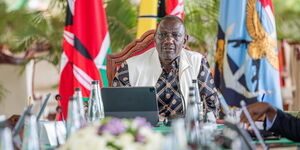Agriculture Cabinet Secretary Mutahi Kagwe on Wednesday, 12 March, vowed to bring an end to tea hawking, a malpractice that costs the tea sector billions of shillings in revenue each year.
While speaking before the Senate, Kagwe announced that the government would take action against individuals engaged in tea hawking by ensuring the implementation of the necessary legislation and enforcing the law.
“Effective this week, or effective today, the hawking of tea across the country, Mr Speaker, will be stopped so that farmers can deliver their tea directly and to ensure that quality standards are met,” Kagwe stated.
“It is our intention to curb tea hawking malpractices, which lead to the processing of low-quality tea leaves. This will be achieved by enforcing the Tea Registration and Licences Regulations, 2025,” he added.
Tea hawking is the practice of independent tea processors and farmers buying green tea leaves directly from farmers, bypassing the established tea factory system.
As per the Tea Act, registered farmers should deliver their tea leaves to their assigned factories. Tea hawking disrupts the system and supply chain, adversely affecting the quality of tea in the market.
Tea hawking, or green leaf hawking, prioritises quantity over quality, resulting in farmers receiving lower prices for their tea as overall tea auction prices decline.
For example, in 2023, according to the Tea Board of Kenya, small-scale farmers lost approximately Ksh53.5 billion due to malpractice.
The vice is particularly prevalent in the Rift Valley region, with Bomet and Kericho counties recording the highest percentage of hawking at 42 per cent. Kisii and Nyamira counties (Region 6) followed closely, with 36 per cent of their green leaf hawked.
While issuing the new directive, Kagwe stated that the Tea Board of Kenya would be at the forefront of enforcing the ban, particularly in relation to independent tea processors.
“We have also instructed the Tea Board to take effective action to control this issue and to ensure that independent processors buy from registered farmers so that the hawking business can be brought to an end,” Kagwe affirmed.
Green leaf hawking is illegal under Section 6(4) of the Tea Act 2020. According to the regulations, if a farmer sells tea to a factory where they are not registered, the penalty is Ksh100,000 or six months in prison. Additionally, if a factory buys tea from a farmer who is not registered under that factory, the fine is Ksh5 million or three years in jail, and the vehicle used to transport the tea may be forfeited to the state.












